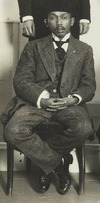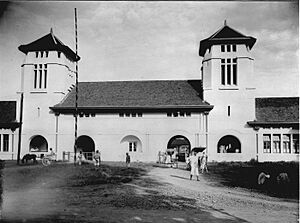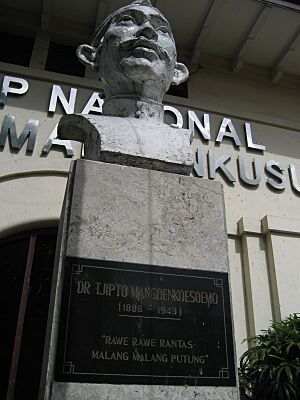Cipto Mangunkusumo facts for kids
Quick facts for kids
Cipto Mangunkusumo
|
|
|---|---|

Cipto Mangunkusumo
|
|
| Born | 4 March 1886 Pecangaan, Dutch East Indies
|
| Died | 8 March 1943 (aged 57) Jakarta, Japanese-occupied East Indies
|
| Occupation | Politician, activist, writer |
Cipto Mangunkusumo (born March 4, 1886, died March 8, 1943) was an important leader in Indonesia's fight for independence. He was also a political mentor to Sukarno, who later became Indonesia's first president.
Cipto, along with Ernest Douwes Dekker and Soewardi Soerjaningrat, started a very important political group called the Indische Party. This party wanted the Dutch East Indies (which is now Indonesia) to govern itself. Because their ideas were seen as a threat by the Dutch colonial government, Cipto and the other leaders were sent away to the Netherlands in 1913.
Beliefs and Ideas
Cipto believed in nationalism for all of the Indies, not just for the Javanese people. He strongly supported democracy throughout his life. He felt that the old ways of Javanese society, which were based on a feudal system, needed to change.
He thought that Western education was important to create a desire for change. Cipto disagreed with another group called Budi Utomo, which focused on bringing back traditional Javanese culture. He believed that the mindset of the Javanese people needed to be completely transformed.
Return and Continued Activism
After Cipto and his friends returned from exile, his two companions chose to focus on education. However, Cipto stayed active in politics. He joined a new group called the "Nationaal Indische Party" and became one of its leaders. He also represented the party in the Peoples Assembly, known as the Volksraad.
When Sukarno moved to Bandung, Cipto became his main political mentor. He helped Sukarno become a strong nationalist who wanted full independence. Both Cipto and Sukarno were determined fighters for freedom. They cared deeply about the struggles of poor farmers.
Cipto was known for taking action to help people. For example, in 1910, he worked tirelessly to help the Javanese people during a serious outbreak of the plague. The colonial government even gave him a special award, the Order of Orange-Nassau, for his efforts.
Later Years and Exile
The Nationaal Indische Party was banned after it supported a farmers' strike. Cipto then helped start the National Party of Indonesia (PNI), which Sukarno led.
Cipto later tried to encourage Indonesian soldiers in the KNIL (the Dutch colonial army) to revolt. Because of this, he was exiled again in 1927, this time to the Banda Islands. Other important revolutionaries like Hatta and Sjahrir later joined him there. During his 11 years in exile, he could not do much political work.
Cipto Mangunkusumo passed away in 1943. He was buried in Ambarawa.
After Indonesia became independent, the 'Centrale Burgerlijke Ziekeninrichting Salemba' hospital was renamed the 'Cipto Mangunkusumo Hospital' to honor him.
Legacy
The Dr. Cipto Mangunkusumo Hospital is named after him. His face also appears on the 200 Indonesian rupiah coins from the 2016 series.
 | Lonnie Johnson |
 | Granville Woods |
 | Lewis Howard Latimer |
 | James West |



